Weapons of math destruction: how big data increases inequality and threatens democracy by Cathy O’Neil. A great number of the article on the list below are written by O’Neil. She is also active on Twitter regularly posting links and interesting critical insights on everything to do with mathematical models and bias. Here is my own review of O’Neil’s book with plenty of relevant links itself and here for another excellent review of O’Neil’s book.
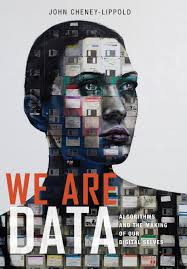
We Are Data: Algorithms and the Making of Our Digital Selves (2018) by John Cheney-Lippold.
Below is the first few paragraph from a review by Daniel Zwi, a lawyer with an interest in human rights and technology. Here is also a link to my twitter thread where you can read excerpts from the book that I tweeted as I read the book.
In 2013, a 41-year-old man named Mark Hemmings dialled 999 from his home in Stoke-on-Trent. He pleaded with the operator for an ambulance, telling them that ‘my stomach is in agony’, that ‘I’ve got lumps in my stomach’, that he was vomiting and sweating and felt light-headed. The operator asked a series of questions — ‘have you any diarrhoea or vomiting?’; ‘have you passed a bowel motion that looks black or tarry or red or maroon?’ — before informing him that he did not require an ambulance. Two days later Mr Hemmings was found unconscious on the floor of his flat. He died of gallstones shortly after reaching hospital.
This episode serves as the affective fulcrum of We Are Data: Algorithms and the Making of Our Digital Selves, John Cheney-Lippold’s inquiry into the manner in which algorithms interpret and influence our behaviour. It represents the moment at which the gravity of algorithmic regulation is brought home to the reader. And while it may seem odd to anchor a book about online power dynamics in a home telephone call (that most quaint of communication technologies), the exchange betokens the algorithmic relation par excellence. Mr Hemmings’s answers were used as data inputs, fed into a sausage machine of opaque logical steps (namely, the triaging rules that the operator was bound to apply), on the basis of which he was categorised as undeserving of immediate assistance.
The dispassionate, automated classification of individuals into categories is ubiquitous online. We either divulge our information voluntarily — when we fill out our age and gender on Facebook, for example — or it is hoovered up surreptitiously via cookies (small text files which sit on our computer and transmit information about our browsing activity to advertising networks). Our media preferences, purchases and interlocutors are noted down and used as inputs according to which we are ‘profiled’ — sorted into what Cheney-Lippold calls ‘measureable types’ such as ‘gay conservative’ or ‘white hippy’ — and served with targeted advertisements accordingly.
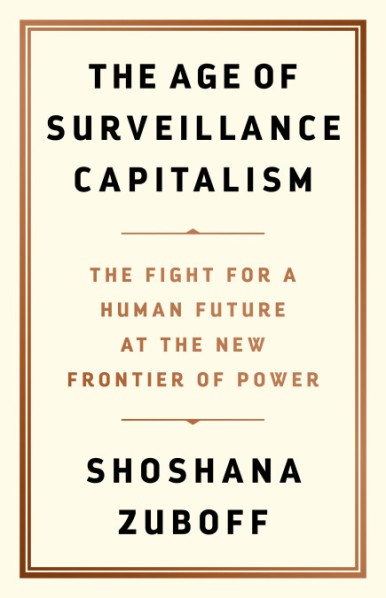
The Age of Surveillance Capitalism: The Fight for a Human Future at the New Frontier of Power (2019) by Shoshana Zuboff
The challenges to humanity posed by the digital future, the first detailed examination of the unprecedented form of power called “surveillance capitalism,” and the quest by powerful corporations to predict and control our behavior. Shoshana Zuboff’s interdisciplinary breadth and depth enable her to come to grips with the social, political, business, and technological meaning of the changes taking place in our time. We are at a critical juncture in the confrontation between the vast power of giant high-tech companies and government, the hidden economic logic of surveillance capitalism, and the propaganda of machine supremacy that threaten to shape and control human life. Will the brazen new methods of social engineering and behavior modification threaten individual autonomy and democratic rights and introduce extreme new forms of social inequality? Or will the promise of the digital age be one of individual empowerment and democratization?
The Age of Surveillance Capitalism is neither a hand-wringing narrative of danger and decline nor a digital fairy tale. Rather, it offers a deeply reasoned and evocative examination of the contests over the next chapter of capitalism that will decide the meaning of information civilization in the twenty-first century. The stark issue at hand is whether we will be the masters of information and machines or its slaves.
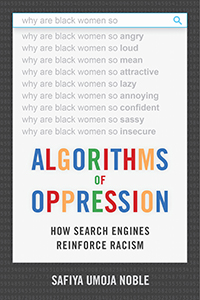 Algorithms of oppression: How search engines reinforce – below is an excerpt from Nobel’s book: You can also find another review of Algorithms of Oppression here. Run a Google search for “black girls”—what will you find? “Big Booty” and other sexually explicit terms are likely to come up as top search terms. But, if you type in “white girls,” the results are radically different. The suggested porn sites and un-moderated discussions about “why black women are so sassy” or “why black women are so angry” presents a disturbing portrait of black womanhood in modern society. In Algorithms of Oppression, Safiya Umoja Noble challenges the idea that search engines like Google offer an equal playing field for all forms of ideas, identities, and activities. Data discrimination is a real social problem; Noble argues that the combination of private interests in promoting certain sites, along with the monopoly status of a relatively small number of Internet search engines, leads to a biased set of search algorithms that privilege whiteness and discriminate against people of color, specifically women of color.
Algorithms of oppression: How search engines reinforce – below is an excerpt from Nobel’s book: You can also find another review of Algorithms of Oppression here. Run a Google search for “black girls”—what will you find? “Big Booty” and other sexually explicit terms are likely to come up as top search terms. But, if you type in “white girls,” the results are radically different. The suggested porn sites and un-moderated discussions about “why black women are so sassy” or “why black women are so angry” presents a disturbing portrait of black womanhood in modern society. In Algorithms of Oppression, Safiya Umoja Noble challenges the idea that search engines like Google offer an equal playing field for all forms of ideas, identities, and activities. Data discrimination is a real social problem; Noble argues that the combination of private interests in promoting certain sites, along with the monopoly status of a relatively small number of Internet search engines, leads to a biased set of search algorithms that privilege whiteness and discriminate against people of color, specifically women of color.
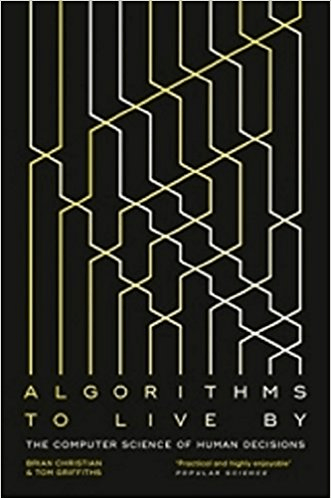
Algorithms to Live By: The Computer Science of Human Decisions by Brian Christian and Tom Griffiths. This book is concerned with the workings of the human mind and how computer science can help human decision making. Here is a post by Artem Kaznatcheev on Computational Kindness which might give you a glimpse of the some of the issues that book covers. Here is a long interview with Brian Christian and Tom Griffiths and a TED Talk with Tom Griffiths on The Computer Science of Human Decision Making.
The Black Box Society: The Secret Algorithms That Control Money and Information by Frank Pasquale. You can read the introduction and conclusion chapters of his book here. And here is a good review of Pasquale’s book. You can follow his twitter stream here.

Technically Wrong: Sexist Apps, Biased Algorithms, and Other Threats of Toxic Tech by Sara Wachter-Boettcher
Here is a synopsis: A revealing look at how tech industry bias and blind spots get baked into digital products—and harm us all.
Buying groceries, tracking our health, finding a date: whatever we want to do, odds are that we can now do it online. But few of us ask why all these digital products are designed the way they are. It’s time we change that. Many of the services we rely on are full of oversights, biases, and downright ethical nightmares: Chatbots that harass women. Signup forms that fail anyone who’s not straight. Social media sites that send peppy messages about dead relatives. Algorithms that put more black people behind bars.
Sara Wachter-Boettcher takes an unflinching look at the values, processes, and assumptions that lead to these and other problems. Technically Wrong demystifies the tech industry, leaving those of us on the other side of the screen better prepared to make informed choices about the services we use—and demand more from the companies behind them.
Paula Boddington, Oxford academic and author of Towards a Code of Ethics for Artificial Intelligence, recommends the five best books on Ethics for Artificial Intelligence. Here is the full interview with Nigel Warburton, published on December 1, 2017.

“Automating Inequality: How High-Tech Tools Profile, Police, and Punish the Poor” by Virginia Eubanks is being published and will be released on January 23, 2018. Here is an excerpt from Danah Boyd’s blog:
“Automating Inequality: How High-Tech Tools Profile, Police, and Punish the Poor” is a deeply researched accounting of how algorithmic tools are integrated into services for welfare, homelessness, and child protection. Eubanks goes deep with the people and families who are targets of these systems, telling their stories and experiences in rich detail. Further, drawing on interviews with social services clients and service providers alongside the information provided by technology vendors and government officials, Eubanks offers a clear portrait of just how algorithmic systems actually play out on the ground, despite all of the hope that goes into their implementation. Additionally, Berkman Klein discusses “Algorithms and their unintended consequences for the poor” with Eubanks here.

The Big Data Agenda: Data Ethics and Critical Data Studies by Annika Richterich PDF available through the link here.
“This book highlights that the capacity for gathering, analysing, and utilising vast amounts of digital (user) data raises significant ethical issues. Annika Richterich provides a systematic contemporary overview of the field of critical data studies that reflects on practices of digital data collection and analysis. The book assesses in detail one big data research area: biomedical studies, focused on epidemiological surveillance. Specific case studies explore how big data have been used in academic work.
The Big Data Agenda concludes that the use of big data in research urgently needs to be considered from the vantage point of ethics and social justice. Drawing upon discourse ethics and critical data studies, Richterich argues that entanglements between big data research and technology/ internet corporations have emerged. In consequence, more opportunities for discussing and negotiating emerging research practices and their implications for societal values are needed.”

Re-Engineering Humanity by professor Evan Selinger and Brett Frischmann
Every day, new warnings emerge about artificial intelligence rebelling against us. All the while, a more immediate dilemma flies under the radar. Have forces been unleashed that are thrusting humanity down an ill-advised path, one that’s increasingly making us behave like simple machines? In this wide-reaching, interdisciplinary book, Brett Frischmann and Evan Selinger examine what’s happening to our lives as society embraces big data, predictive analytics, and smart environments.
Outnumbered: From Facebook and Google to Fake News and Filter-bubbles – The Algorithms That Control Our Lives (featuring Cambridge Analytica) by David Sumpter. A review from Financial Times, here.
Artificial Unintelligence: How Computers Misunderstand the World
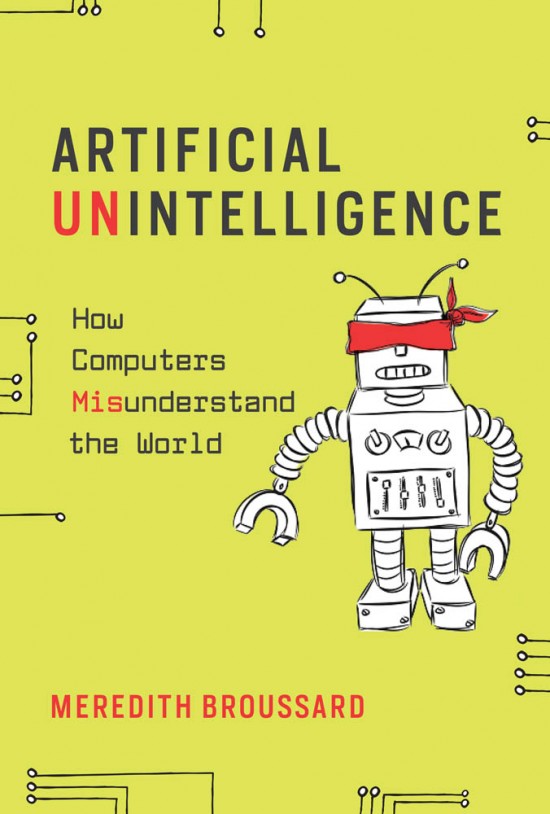 A guide to understanding the inner workings and outer limits of technology and why we should never assume that computers always get it right.
A guide to understanding the inner workings and outer limits of technology and why we should never assume that computers always get it right.
“In Artificial Unintelligence, Meredith Broussard argues that our collective enthusiasm for applying computer technology to every aspect of life has resulted in a tremendous amount of poorly designed systems. We are so eager to do everything digitally—hiring, driving, paying bills, even choosing romantic partners—that we have stopped demanding that our technology actually work. Broussard, a software developer and journalist, reminds us that there are fundamental limits to what we can (and should) do with technology. With this book, she offers a guide to understanding the inner workings and outer limits of technology—and issues a warning that we should never assume that computers always get things right.”
Back to the main resources page
One comment